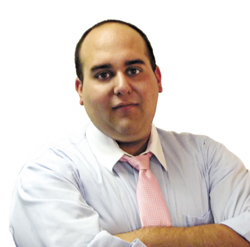Schools missing the grade protecting LGBT youth

So far, I have two major regrets in life. The first is ever starting to smoke. The second, not coming out in high school.
The fact of the matter is, I knew I was gay. Unlike some, I was fortunate enough to know what it meant to be a boy who liked boys. And I believe my immediate family would have supported me back then as they do now.
Wandering down memory lane, I’m not really sure why I didn’t come out. Yes, I was teased. But I was never outright called a fag or a sissy. The taunting – that mostly took place during high school and my first two years of high school – was mostly generic and/or about my weight problem.
One time, in sophomore Spanish, Travis Bliss asked me which of the senior girls I thought were cute. I panicked. He was on to me, for sure. Luckily, I didn’t break any moral code when I told him I really didn’t know any upper class girls. It held him off. And that was pretty much the last time anyone challenged my sexuality – at least to my face.
For my remaining days, I played the asexual card pretty well. So well, I had pretty much convinced myself – that was until gym class or 20 minutes at home with dial-up Internet access.
How did we ever watch porn online before high-speed?
There was one time, after a speech and debate tournament. The boys on the team decided to have a sleep over. Crown Royal was there, too. Nothing really happened, not for a lack of trying. But I digress.
I bring all this up because of a report One Colorado released shortly after PrideFest.
(Sidebar: Really Jace Woodrum, you couldn’t have given me a week to recoup?)
It turns out, most of Colorado’s school districts – K-12 – have yet to update their bullying policies to come into compliance with a 2011 law that’s mission was to toughen up said policies, and that clearly spelled out bullying someone for sexual orientation or gender identity is a no-no.
What’s worse, nearly 40 percent of schools have yet to update their rules to reflect a 2008 law that expanded the state’s non-discrimination law to include the LGBT community.
The study also found only 61 percent of schools include LGBT students as a protected class in their harassment policies.
“It’s funny to think about it,” One Colorado’s Executive Director Brad Clark tells me. “If you got a 37 percent on a test in high school, that wouldn’t be very good.”
That’s right, only 37 percent of all school districts in Colorado have their policies completely up-to-date.
“These districts are really failing our young people by not protecting them,” Clark said.
How do the youngins’ put it? “#fail.”
So how do school districts protect students? Clark said most evidence points to three key objectives: having updated and LGBT-inclusive harassment policies, having a gay-straight-alliance and having teachers trained in how to stop and prevent bullying.
Disappointingly, there are no repercussions for school districts that do not have their policies updated. However, as Clark pointed out to me, that doesn’t mean school officials are off the hook. Administrators and school boards can still be held liable if a student is not adequately protected because state law supersedes a district policy.
Apart of the press release One Colorado sent out was a detailed list of school districts and how they’ve complied with the state laws. I scroll down to Pueblo School District 60 – now known as Pueblo City Schools. It turns out they have a patchwork of policies that include LGBT and gender expression.
When I was a junior at Pueblo South – the school likes to think of its self as “Pueblo’s Pride” – a student and teacher tried to start a GSA. Their request was denied. I called the other day and talked to a secretary. She didn’t know if there was a GSA established or not. She transferred me to my old geography teacher who has assumed the duties of athletic and activities director. I left a voicemail and have yet to receive a response.
Meanwhile, I stopped by the Denver Public Library to do research for another story I’m working on. I came across a clip – that’s official journalism jargon – from the Rocky Mountain News, dateline June 22, 1986.
The story was about gay youth. I admit, I didn’t read the entire article. But one quote did stand out: “No matter how much ridicule I get or no matter what a hard time people give me, it’s still more painful not to be who you are.”
That is one of life’s greatest lessons. And Colorado’s schools should be teaching it.
What's Your Reaction?
Out Front contributor Nic Garcia is a lifelong journalist and works for Colorado education policy news organization EdNewsColorado. He was an Out Front managing editor, associate publisher and executive editor from 2011 to 2013.










